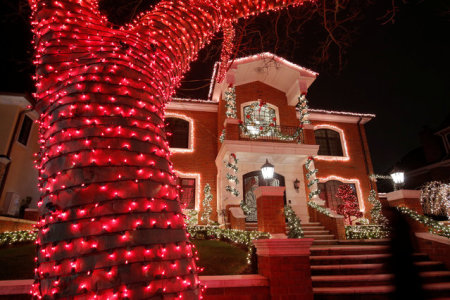Univ. of Minnesota: Red and Green, Santa, Nativity Scenes 'Not Appropriate' at Holiday Parties

Officials at the University of Minnesota consider certain holiday decorations and colors "not appropriate" for parties, according to a document distributed at an event within the College of Food Agricultural and Natural Resource Sciences.
Earlier this month, CFANS hosted a "Respecting Religious Diversity" event under the banner of "Dean's Dialogues." Nativity scenes and Santa Claus along with the colors red and green were discouraged as were Hanukah menorahs, dreidels and the colors blue and white.
CFANS noted in the event's description that evangelical Christianity, Islam, Buddhism, Judaism, Scientology are but some of the 300 religious and spiritual belief systems within the United States, the state of Minnesota, and within the school.
"Our religious/spiritual beliefs and practices can play a key role in our identity but can be 'off limits' for discussion especially in public spaces."
Yet when it comes to planning holiday gatherings, University of Minnesota officials suggested that other things ought to also be off limits. A handout that was passed out at the event urged those in attendance to "[c]onsider neutral-themed parties such as a 'winter celebration,'" and that "decorations, music, and food should be general and not specific to any one religion."
The U of M (@UMNews) shared this letter with some faculty and student employees this week The colors red & green, blue & white/silver are verboten during the "winter celebration" period. Images of Santa, wrapped gifts, and bells are also deemed "religious iconography." #BahHumbugpic.twitter.com/sxzqDXLLqY
— Jon Miltimore (@miltimore79) December 14, 2017
Among the inappropriate decor listed to avoid were angels, Nativity scenes, bows, wrapped gifts, Christmas trees, and Santa Claus. Parties should not feature red and green due to its connection with "Christian tradition," the handout said. Party planners should also avoid menorahs, dreidels, and the colors blue, white, and silver since they are connected to "Jewish Hanukkah."
Becket, a leading religious liberty advocacy group, announced Thursday that they were giving the Minnesota university it's annual "Ebenezer" award.
"A University that bans religious diversity in the name of 'Respecting Religious Diversity'—George Orwell would be proud," said Montse Alvarado, executive director of Becket.
"But it makes no sense to 'celebrate' religious diversity by banning any sense of actual holiday celebration."
Each year, Becket produces a list of outrageous offenders and hands "the most scandalous holiday season transgressor a present worse than coal itself," the award is described on its website.
"A hearty bah-humbug toast to University officials who make Christian and Jewish students feel like second class citizens at a time that should be full of brotherly love and giving," Alvarado continued.
Students at the event were reportedly urged to report "bias incidents" of "inappropriate religious celebrations in your work or learning environment" to the Office of Equal Opportunity and Affirmative Action.
The university, for its part, said the document was a "conversation piece to facilitate dialogue at a voluntary, internal college event on respecting religious diversity in the workplace," according to university spokesperson, Emma Bauer, in a statement to Fox News.
Becket noted how governments and public institutions are allowed to recognize religious holiday displays and celebrate them with the appropriate symbols given how important such festivities are in human culture.
The Supreme Court has upheld as constitutional holiday displays that send "a message of pluralism and freedom of belief during the holiday season," including displays that have distinctively religious elements.
"Although public opinion and the law are on the side of religious holidays, some bureaucrats insist on scrubbing the public square of any religious references. This often leads to absurd results," Becket said.
Last year, the group gave the Ebenezer award to the American Humanist Association which filed a suit in Colorado attempting to stop public school children from volunteering for a program that sends care packages to children in need because they deemed it "too religious."





















